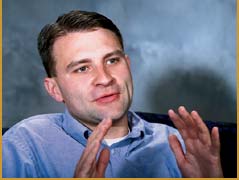| |
|
| |
|
|||||||
|
Cory Tennison knows real-life legal drama isn't generated by surprise witnesses or courtroom confrontations like those on television shows such as Law & Order or The Practice. Instead, the UW-Madison third-year law student will tell you about long, caffeine-fueled nights spent poring over boxes of trial transcripts, witness depositions, and DNA test results. But sometimes, burrowing through hundreds of pages of documents can unearth more drama and excitement than any television show or movie. As a member of the Wisconsin Innocence Project, an arm of the Law School's Frank J. Remington Center, Tennison and two other students did exactly that. Their discovery of previously overlooked DNA evidence helped free Chris Ochoa, a Texas man convicted and imprisoned for a 1988 rape and murder he did not commit. Ochoa's exoneration was the first for the Innocence Project, supervised by law professors John Pray and Keith Findley. Formed more than three years ago, the program investigates claims of innocence by convicts in state and federal prisons. "The Innocence Project is the embodiment of the Wisconsin Idea," Tennison says about the concept that UW-Madison's boundaries extend to the state and beyond. "I had the chance, as a 22-year-old student, to help free an innocent man. That's an educational opportunity that cannot be matched." Ochoa's release last January thrust the Innocence Project into the national spotlight. Yet, Pray says, Tennison is motivated by the search for justice, not media attention or a fat salary. "At a certain point in the Ochoa case, Cory took the ball and ran with it," he says. "From that moment on, he almost lived in my office and he spent an incredible number of hours working on every aspect of the case. But that's the kind of person he is. He jumps into everything he does all the way." The St. Paul, Minnesota native and American University graduate has dreamed of being a lawyer since he was 8 years old. But, he says, the Ochoa case gave him a new perspective on the justice system — one that has shaped his career plans. "For more than a century, the Wisconsin Idea has been a core value of UW-Madison — a value of extending the resources of the university in service to the state and nation — that sets us apart from universities around the world. Through the creation, application, transfer, and integration of knowledge, the Wisconsin Idea creates a partnership between the university and the people and resources of Wisconsin, the nation, and the world." — Howard Martin,
|

Graduate School staff provided a public service right on campus when they volunteered their time to add native Wisconsin plant species along the edge of Muir Knoll Woods. |
|
|
|
|